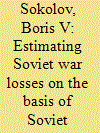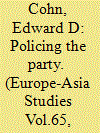| Srl | Item |
| 1 |
ID:
133763


|
|
|
|
|
| Publication |
2014.
|
| Summary/Abstract |
The problem of calculating the Soviet losses in the Second World War has confronted scholars with potentially insoluble difficulties. Especially in the first year of the war, during the catastrophic defeats and disorganized retreats, individual records on Soviet military personnel were either simply not kept or were lost or destroyed. Even during the war, the Soviet government criticized the failure to keep casualty lists up to date and noted that often soldiers were killed or went missing even before they were formally added to the unit rosters. The Red Army had no equivalent to the dog tag. Many soldiers, out of superstition, refused to wear the smertniki-little wooden cases that held identification information on slips of paper-believing that a wearer was ordained to die. Official estimates to this date, however, appear plainly understated. The author proposes a new method for estimating the Soviet personnel losses in the Second World War, based on the 1939 and 1956 censuses of the Soviet population.
|
|
|
|
|
|
|
|
|
|
|
|
|
|
|
|
| 2 |
ID:
139281


|
|
|
|
|
| Summary/Abstract |
Research indicates that in Central Asia and Azerbaijan the patterns of devotion to the Islamic faith are not uniform. Although the vast majority of Central Asians consider Islam to be an integral part of their social identity, the years of rule by the Soviet regime have affected the Islamic faith. This study investigates the different patterns of religious observance in Kazakhstan, Kyrgyzstan, Uzbekistan, Tajikistan, and Azerbaijan. Latent class analysis (LCA) is used to examine the profiles of religious observance based on data obtained from the Gallup World Poll. Across the five countries, three distinct classes emerge from the analyses: Devout Pious, Moderate Pious, and Soviet Muslims. Additionally, the predictive variables are considered and demographic covariates are examined in multinomial logistic regressions. Gender, educational level, and income are predictive of class membership in most of these countries. This study is a ground-breaking attempt to quantitatively examine classifications of devotion to Islam in post-Soviet republics with a majority Muslim population.
|
|
|
|
|
|
|
|
|
|
|
|
|
|
|
|
| 3 |
ID:
129462


|
|
|
|
|
| Publication |
2013.
|
| Summary/Abstract |
During the late Stalin era, many of the USSR's local party control officials and prosecutors entered into a protracted conflict over who had the right to judge the conduct of communists; prosecutors charged that party committees were shielding communists from prosecution, while control officials claimed that party organs were deferring to prosecutors and abandoning their traditional oversight role. This article will argue that although some party committees were interfering in the courts, the dominant story of party-procuracy relations under post-war Stalinism involved the disengagement of party organs from the oversight of administrative wrongdoing, with long-lasting consequences for the Soviet regime's attitude toward corruption.
|
|
|
|
|
|
|
|
|
|
|
|
|
|
|
|